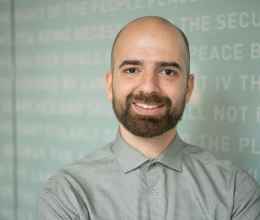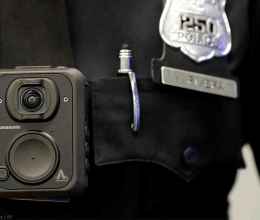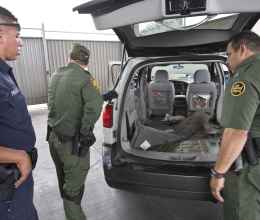Today, the ACLU Foundation of Southern California (ACLU SoCal) and Asian Americans Advancing Justice – Los Angeles are appearing before the 9th Circuit Court of Appeals to enforce the rights of U.S. citizen Naji Hamdan, a Muslim-American man from Southern California, to find out whether the U.S. government was involved in the torture that he experienced in the United Arab Emirates (U.A.E.).
Like many Muslims across the country, Hamdan and his family experienced intensive surveillance by the FBI and other government agencies. In Hamdan’s case, this surveillance continued even after he moved with his wife and children to the U.A.E., where he had a business. In the summer of 2008, shortly after FBI agents interrogated him at the embassy in the U.A.E., the U.A.E.’s state security forces arrived at his house and without explanation placed him in a blindfold and shackles, forced him into a vehicle and took him to a “black site,” where he was imprisoned in complete isolation from his family or any legal representative.
For the next three months, the U.A.E. kept him at the black site where he was subject to severe torture. Among other horrific abuses, Hamdan was locked in a refrigerated, underground room with almost no clothing for hours; blindfolded and beat on his back, legs, head and the soles of his feet; kicked in the liver with military boots despite his disclosure that he had a liver condition; strapped to an electric chair and told that they would activate it unless he falsely confessed to unspecified “terrorist activities”; and threatened with the abduction and rape of his wife. During at least one of these interrogation sessions, a man who spoke English with a perfect American accent spoke to Hamdan, and pressed him to tell the Arabic speaking interrogators what they wanted to know. Although he was blindfolded, Hamdan could see through the bottom of his blindfold that the man wore Western-style shoes and pants, unlike the other interrogators.
Several months after his abduction, Hamdan’s family filed a habeas petition with the U.S. government seeking his release from the black site, alleging that the U.A.E had detained Hamdan under the direction of the U.S. government, a close ally of the U.S. in national security matters. The U.S. government has acknowledged that it has participated in interrogations of suspects in the custody of foreign governments—also known as ‘proxy detention’—where the suspect is denied basic due process and human rights protection they would be afforded in the U.S. This practice has been widely criticized by human rights and civil liberties advocates, and most recently by the Senate in a report on the CIA’s detention and interrogation program, which described similar incidents of U.S. proxy detention.
Days after his family sued the U.S. government, the U.A.E. released Hamdan from the “black site” without explanation, transferring him to a U.A.E. prison. Thereafter, the federal government obtained a dismissal of the habeas case filed on Hamdan’s behalf. After several months, Hamdan was released from U.A.E. prison after being convicted of vague and unsubstantiated offenses.
In 2010, after Hamdan was released, he filed a Freedom of Information Act (FOIA) request seeking information about the U.S. government’s involvement in the horrific human rights violations he experienced in the U.A.E. After more than four and a half years, Hamdan has still not received the answer to a very simple question: was our government involved in the lengthy detention and brutal torture that he experienced?
“Bad things happen in our lives,” says Hamdan. “Some we naturally forget, and some we make efforts and seek help to forget but we cannot, and the pain seems to revive with memories. But knowing the truth of what happened to me in U.A.E. would ease up this agony.”
Today, ACLU SoCal and Advancing Justice are standing with Hamdan to demand that the U.S. government disclose all the information that the FOIA open government law requires. FOIA has long served as a critical tool in uncovering government abuse and holding the government accountable to the rule of law. This case, involving the potential participation of the U.S. government in the detention and torture of one of its own citizens, highlights the need to ensure that FOIA is vigorously enforced.
Learn more about this case.
Michael Kaufman is staff attorney at the ACLU of Southern California. This blog was adapted from Asian Americans Advancing Justice - Los Angeles. Follow ACLU_SoCal.



